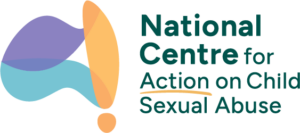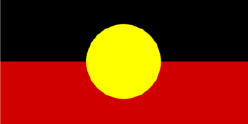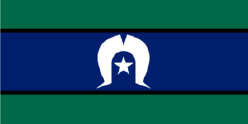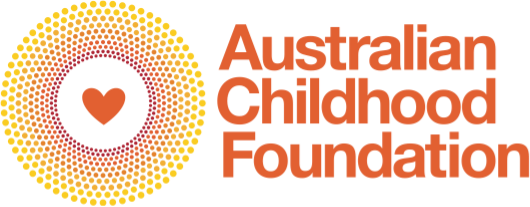The National Centre for Action on Child Sexual Abuse (National Centre) is a symbol of hope and an essential vehicle for action for many victims and survivors of child sexual abuse. Its formation recognises the decades of advocacy by victims and survivors to be listened to, believed, validated, protected and ultimately supported to heal from the trauma they carry with them. Its focus extends beyond institutional child sexual abuse to abuse that occurs in the family, community and online.
The National Centre has woven the voices and experiences of victims and survivors into its very fabric. It acknowledges the strength and expertise that derives from their lived and living experience of child sexual abuse. The National Centre recognises and honours the diversity of victims and survivors' experiences, identities and cultural backgrounds and their contributions to the common purpose of addressing child sexual abuse.
Our founding story
The establishment of a national centre to raise awareness and understanding of child sexual abuse, support help-seeking and guide best practice, was a key recommendation (9.9) of the 2017 Royal Commission into Institutional Responses to Child Sexual Abuse. The Royal Commission identified that ongoing national leadership is necessary to improve outcomes for victims and survivors of past child sexual abuse and prevent future child sexual abuse.
Of the 136 Royal Commissions conducted since Federation, this was the first relating specifically to the sexual abuse of children and young people. It was a watershed inquiry that helped the nation to understand the real and enduring effects of the trauma stemming from child sexual abuse. It also made it clear that “the number of children who are sexually abused in familial or other circumstances far exceeds those who are abused in an institution.” As such, the National Centre will focus on child sexual abuse in all the contexts in which it occurs.
Founded in late 2021, the National Centre is a partnership between three respected organisations with strong histories of leadership in responding to the child sexual abuse – the Australian Childhood Foundation, Blue Knot Foundation and the Healing Foundation.

Our vision
A community where children are safe and victims and survivors are supported to heal and recover, free of stigma and shame – a future without child sexual abuse.
Our purpose
To disrupt the dynamics that have failed to stop child sexual abuse and prevented victims and survivors from being believed, validated and supported in the ways they need.
Our strategies & plans
Click to learn more
This Strategy represents the start of a committed journey for the National Centre to transform the way that child sexual abuse is understood and responded to in Australia.
It describes a collective ambition in which we all work together to:
- empower, educate and enable families, communities and service providers to better meet the needs of victims and survivors of child sexual abuse across their lifespan
- empower children, young people and adults who have experienced child sexual abuse to heal and recover
- inspire community, policy and practice change to stop child sexual abuse from occurring.
Here for Change – Our Five Year Strategy has been widely consulted in its development and sets the starting point for what the National Centre intends to do. We cannot achieve our plans, however, without collaborating closely with the many national, state and local initiatives. For this reason, the National Centre will periodically pause and reflect on the best way it can continue to meet the intentions of those the Strategy seeks to benefit. This Strategy will also continue to evolve over time with the input of victims and survivors and other key people and organisations.
This Plan sets out the importance and role of learning and professional development to the National Centre’s strategic goals. It outlines our direction and approach to build and strengthen the capability of workers and organisations in how they respond to and support victims and survivors of child sexual abuse, and how this will be achieved through training, learning and development opportunities.
This Plan sets out the National Centre’s strategic research objectives and priorities and describes the ways in which we will deliver these to a high standard. The aim is to build an accessible and robust evidence base that will contribute to addressing our seven key challenges and supports our organisational goals.
Our board
Meet the team

Dr Joe Tucci
Chair

Dr Cathy Kezelman AM
Deputy Chair

Shannan Dodson
Board Member

Fiona Cornforth
Board Member

Janise Mitchell
Board Member

Belinda Johnson
Board Member

Michael Go
Board Member

Glenn Kennedy
Board Member
Click on board member to read bio

Dr Joe Tucci
Chair
Dr Joe Tucci is the Chief Executive Officer of the Australian Childhood Foundation, a social worker and psychologist. He has completed a PhD in emotional abuse and uses post-modern and narrative ideas in research, counselling and training. He has a particular interest in the impact of abuse-related trauma on brain development and the implications for practice. Joe has extensive experience in the provision of consultancy, clinical supervision and program development and evaluation.

Dr Cathy Kezelman AM
Deputy Chair
Dr Cathy Kezelman AM is a medical practitioner, President of Blue Knot Foundation and has a lived experience of complex trauma. She has been a driving force within Blue Knot, previously ASCA, for over two decades and has held a number of board and key representative roles within the mental health and related sectors.
Cathy is co-author of a range of seminal Blue Knot publications and guidelines, a prominent voice in the media and at conferences, and a national advocate for trauma-informed transformational changes and informed responsiveness to people experiencing the impacts of complex trauma.

Shannan Dodson
Board Member
Shannan Dodson is a Yawuru woman and CEO of the Healing Foundation. She was previously the Deputy CEO of the National Aboriginal Sporting Chance Academy (NASCA).
She has over 18 years experience working in Indigenous affairs and is a strategic communications and engagement specialist. She has extensive skills in management, campaigning, public speaking, media, writing, and community engagement.
She was recently the Co-Chair of the National NAIDOC Committee and worked on the Australian Marriage Equality campaign. Shannan is passionate about First Nations’ rights and understanding mental health issues, particularly intergenerational trauma for Aboriginal and Torres Strait Islander communities.

Fiona Cornforth
Board Member
Fiona Cornforth is of the Wuthathi of the far north-east cape of Queensland with family roots also in Zenadth Kes. She is a founding Board Member of the National Centre as previous CEO of The Healing Foundation. Fiona has gained experience and perspectives in education, leadership and business development locally and globally and shares a message of celebration and gratitude for the greatness of ancestors, Elders, and the ontology and authority that holds her and her family. Fiona is now Head of Centre at the National Centre for Aboriginal and Torres Strait Islander Wellbeing Research at the Australian National University.

Janise Mitchell
Board Member
Janise is a social worker, Deputy CEO at the Australian Childhood Foundation and Director of the Centre for Excellence in Therapeutic Care. She has experience in child protection, high risk adolescents, public policy analysis, program development and evaluation and has extensive experience in the development of innovative therapeutic programs for traumatised children and young people.
Janise is responsible for the development and implementation of a number of national and state-wide therapeutic out-of-home care programs, child abuse prevention programs and professional education training programs. She has a Masters degree examining the policy and practice underpinning therapeutic care initiatives in Australia and is an Adjunct Associate Professor with Southern Cross University.

Belinda Johnson
Board Member
Belinda Johnson is Deputy CEO of the Blue Knot Foundation and an accountant with over 25 years of finance and business experience in a variety of SME’s. Belinda has a strong background in corporate governance, business and finance management, audit and risk and competitive/lean manufacturing.
Currently, Belinda is in Public Practice, providing Cloud-based financial management solutions to a variety of micros and SME. Belinda holds a Bachelor of Business (Accounting) from UWS and a Certificate in Governance Practice with the Governance Institute of Australia.

Michael Go
Board Member
Michael Go is a seasoned executive with over 30 years of experience in C-Suite and Non-Executive Director roles. He has held senior leadership positions at a number of organisations in investment banking, capital markets, technology and not-for-profits. In these roles, he has demonstrated a proven track record of success in growth, regulation and compliance and business transformation.
Michael is passionate about using his skills and experience to make a positive impact on the world. He is particularly interested in working with organisations that are focused on social justice, environmental sustainability and education. In addition to his professional experience, Michael is also an active speaker and writer on topics related to leadership, innovation and social impact. He is a regular contributor to industry publications and has spoken at events internationally. Michael is a highly motivated and results-oriented leader who is committed to making a difference in the world.

Glenn Kennedy
Board Member
Glenn Kennedy has extensive legal, fiduciary, trustee, compliance, governance, and risk framework experience in international banks across Asia, Europe and Australia. As a values and integrity-driven senior leader and CEO, he has a track record in stewardship, industry engagement, driving transformation and enhancement in business performance.
Glenn also has considerable director experience and a passion for heritage management, is a qualified solicitor and has worked in legal practice in Sydney and Dublin.
Our executive team
Meet the team
Meet the team

Dr Leanne Beagley
CEO

Scott Thompson
Director of Finance and Corporate Services

Alisa Hall
Director of Practice Development and Engagement

Professor Andrea de Silva
Director of Knowledge Generation, Research and Evaluation

Anna Bartsch
Director, Lived Experience Leadership
Our staff team
Click on team member to read bio

Dr Leanne Beagley
CEO
Leanne brings more than 30 years’ experience in the health, mental health and non-government social service sectors. She started as a clinician and then a leader in child and youth mental health settings, moving into government policy leadership and then into advocacy at a national level. She brings expertise in system, program and policy design, service development and commissioning, organisational strategy and risk management – and she has sought to amplify the voices of those with lived experience throughout all of this work.
Leanne’s professional qualifications are in Occupational Therapy and Family Therapy and she holds a Master of Business Leadership degree and a Master of Laws degree. She is a graduate of the Australian Institute of Company Directors and holds a PhD in Psychology in organisational dynamics. Committed to strong, sound, strategic and accountable governance, Leanne has expertise as a non-executive Director including as a past Board Chair with Eating Disorders Victoria, a Deputy Chair of the Board of Tweddle Child and Family Centre and a Director of the Western Alliance Academic Health Science Centre. She has recently been appointed to the Board of PANDA (Perinatal Anxiety & Depression Australia).

Scott Thompson
Director of Finance and Corporate Services
Scott Thompson is a CPA and has an MBA from Deakin University. He worked in public practice in Australia before moving into corporate roles after moving to London in 2001. He started his corporate career at Thomson Reuters before moving into the technology and software industry where he gained experience in large international organisations and private equity.
Upon relocating back to Australia in 2015, Scott has worked in the mental health, education and disability sectors. It is from these roles that Scott found a sense of purpose from working with charities and not-for-profits, leading him to the role of Director of Finance and Corporate Services at the National Centre for Action on Child Sexual Abuse.

Alisa Hall
Director of Practice Development and Engagement
Alisa is a social worker, service leader and executive with 30 years of experience working in health, community care, and violence against women and children service areas and settings. She has extensive experience leading workforce programs and initiatives to build the capability of practitioners, organisations, sectors and industries, including as Deputy Director of Health and Community Services Workforce Council and Director of Programs at the social impact organisation Pilotlight UK.
With qualifications in social work, public health, organisational behaviour and governance, Alisa has held numerous board and committee roles across the areas of education, consumer advocacy and community care.

Professor Andrea de Silva
Director of Knowledge Generation, Research and Evaluation
Andrea is an experienced applied research professional, knowledge generator and thought leader with over 20 years of experience working across diverse areas of public health, prevention, social justice, and inequalities. Her skills include co-designing and evaluating solutions to complex societal problems informed by lived experience, data, evidence and practice-based knowledge. Andrea uses her expertise and experience to create evidence-based services, policies and laws, and drive system reforms to address barriers that harm, marginalise and oppress.
She has led research teams in top tier universities and previously held roles as Research Director in several Victorian public sector organisations. In addition, Andrea has published over 150 research articles and reports, presented internationally and is an adjunct Professor at Monash University.

Anna Bartsch
Director, Lived Experience Leadership
Anna has extensive leadership and reform experience in South Australia’s Human Services sector, including work in child protection, youth justice, disability, mental health, substance abuse, Aboriginal health and community services with populations including First Nations, culturally and linguistically diverse and LGBTIQA+ communities.
She is a member of the South Australian Chief Psychiatrist’s Lived Experience Advisory Group and her own child sexual abuse lived experience includes interaction with the Royal Commission, police and the criminal and civil courts systems. Anna has degrees in psychology and communications and further qualifications in mediation, engagement, change management and family violence safety planning.
Our staff team
We have a group of highly capable staff who work across research, communications, knowledge dissemination and organisational functions and who are committed to ensuring that everything we do strikes a balance between empathy and expertise, between reflective listening and targeted action.
Our governance








